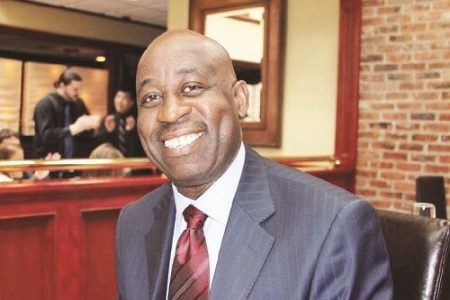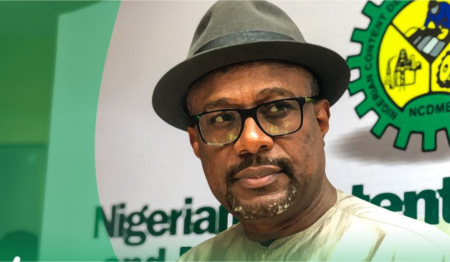 20 December 2011, Sweetcrude, LAGOS – The Nigerian Bar Association (NBA) and the Nigerian Medical Association (NMA), Monday, joined forces with the growing opposition to the Nigerian government’s planned removal of fuel subsidy as from next year.
20 December 2011, Sweetcrude, LAGOS – The Nigerian Bar Association (NBA) and the Nigerian Medical Association (NMA), Monday, joined forces with the growing opposition to the Nigerian government’s planned removal of fuel subsidy as from next year.
While the the NBA warned that going ahead with the policy would unleash unimaginable socio-political upheaval on the country, the NMA feared that the policy might further impoverish the masses and fail to address the problems it was intended to tackle.
This is coming as the Central Working Committee (CWC) of the Nigeria Labour Congress (NLC) meets today in Abuja to take a stand on the controversial 2012 budget presented last week to the National Assembly by President Goodluck Jonathan and firm up decisions on the fuel subsidy question.
However, the Minister of Information, Mr Labaran Maku, Monday appealed to Nigerians for understanding, saying that failure to remove fuel subsidy would unfurl a greater economic hardship than envisaged and throw coming generation of Nigerians into avoidable economic abyss.
Indeed, the Group Managing Director of the Nigerian National Petroleum Corporation (NNPC), Engr. Austen Oniwon, said the government would forge ahead with fuel subsidy removal in the new year, noting that the corporation and its subsidiaries were primed to benefit from the action.
They spoke as former governor of Kwara State and Chairman Senate Committee on Environment and Ecology, Dr Bukola Saraki denied that the Senate had been bribed by President Goodluck Jonathan to support the policy and Canadian High Commissioner, Chris Cooter, said debates on the policy would strengthen the country’s democracy.
Speaking at a press conference in Abuja, NMA President, Dr. Omede Idris, urged the government to focus its attention on breaking the fuel subsidy cartel instead of removing the subsidy.
Noting that the government’s inability to break the fuel subsidy cartel for the benefit of Nigerians was a failure on the part of President Goodluck Jonathan’s Administration, he said: “The NMA joins millions of Nigerians to reject this poison ivy, until freedom from economic slavery is achieved. Selective advocacy and propaganda will not solve this problem as the removal of fuel subsidy will further impoverish the already poor majority of Nigerians through multiplier effects on the cost of services in all areas.
“The NMA is worried that, this will again reduce the gains in health outcome especially for the majority of the poor population across the land especially at state and local government levels where there are no safety nets such as social health insurance both for formal and informal sector. It is sad to note that government’s main reason for proposing the removal of subsidy is the existence of a cartel to which all benefits go to.
“It sounds like an admission of failure that government is aware of the cartel and cannot break it with all its might and power. The whole subsidy matter is encapsulated and shrouded in fraud, which government is shying away from addressing, but would rather withdraw from funding the fraud by the untouchables in the society, and passing the responsibility to the already impoverished and traumatized Nigerians.”
Fuel subsidy removal, he said, should be preceded by rehabilitation of all existing refineries to operate at full capacity, just as he called on the government to tackle corruption frontally rather than being selective in the fight against graft.
He also faulted the N282.77 billion proposed by President Jonathan for the health sector in the 2012 budget, saying the 5.95% of the total budget proposal given to health was far below the 15% of total budgets agreed by African Heads of States in 2001.
It’s an affront on well-being of Nigerians – NBA
In like manner, NBA President, Mr. Joseph Boderin Daudu (SAN), who spoke at a press conference in Kaduna, said the plan to remove oil subsidy was an affront on the collective well-being of Nigerians.
His words: “The action will leave proponents of deregulation and subsidy removal with a bloody nose. If the Jonathan government appears adamant in its quest to remove the subsidy, Nigerians are equally resolved in their opposition to the removal of the subsidy.
His words: “Nigeria is up for rough times ahead. The time has come for a final determination whether those in government derive their power from the people or whether they are independent and owe their stay to other entities other than the people. We foresee a victory and liberation for the people of Nigeria, while those pushing for deregulation in the present form will depart with more than a bloody nose.
“How come the supposed subsidy rose to N1.3 trillion without a corresponding increase in the supply of fuel?”. Throughout the Obasanjo administration and up to the close of the Yar’Adua’s administration, subsidy did not exceed N300 billion. How did it shoot up to N1.3 trillion or thereabout? This should remain a matter for serious inquiry
“The NBA will not support the removal of subsidy. The points government is giving at this stage is suspect. Government is aware of the fact that the policy is anti-Nigerians.
“This is not an argument they will win or a policy that can be implemented without imposing considerable long-term hardship on Nigerians. “Removing what is considered as subsidy will cripple the economy and lives of Nigerians.
“In between, Nigerians will suffer, unmanageable socio-political upheaval will erupt, the magnitude not seen anywhere in the world in recent times. If the government is sincere about tackling the mess in the economy on this issue, government must evolve or design a seven-year staggered phase of removal of petroleum subsidy. And government must as part of the phased measures of subsidy removal repeal the PPPRA act.”
Retaining fuel subsidy is a time bomb – Maku
However, Maku, during a visit to the corporate headquarters of Vanguard Newspapers in Laagos on Monday, agreed that in the interim, the policy would inflict sufferings on the citizenry, which he said would ease off in the long run to the overall benefit of the economy.
Painting a no hope situation, the minister said the government was faced with two unpalatable options of short-time pains with subsidy removal or perpetual pains with non-removal of the subsidy.
Citing the examples of the Aviation and telecom sectors, which have benefitted from deregulation in spite of initial pains, Maku wondered where Nigeria would have been if the two sectors had not been deregulated.
He assured that the N1.33 trillion that would be saved from fuel subsidy would be funneled into the government’s three pillars of governance: revamping infrastructure, ensuring human capital development and improving governance.
On fears that fuel price would hit the roof top, Maku said there would be no fixed price for the product. “In the first instance, there will be no fixed price for petroleum. It will go up and it will come down depending on price of crude oil; which is what happens in every other country. Just like there is no fixed price for a tuber of yam, there is no fixed price for garri.
So, it will become like any other commodity and when the cost of crude goes up, it will go up; when the cost of crude comes down, it will come down. What is clearly going to happen also is that the NNPC will remain a major player. We are going to achieve local refining which will take up the cost of taking petrol from here to Europe, refining it and bringing it back. When you are taking it away, you pay and when you are bringing it back, you pay.”
Disclosing that the government would set up a regulatory agency that would monitor prices of crude oil in the post-deregulation era, he appealed: “I will want to appeal to Nigerians to look at the issue of fuel subsidy removal dispassionately. There is also a regulatory agency that has been set up to regulate the market in the post-deregulation, we have set it up and they will monitor the prices and regulate the players in the industry. Just like we have the NCC as a regulatory agency in the telecom sector, we have a regulatory agency that will regulate the oil market in post-deregulation.”
While enjoining Nigerians to understand the motive of government in deregulating the oil sector, Maku said: “What I will say is that skepticism and fear of the unknown is always something that every human being is worried about. The truth of the matter is that something must give and that means that we have to change certain things for certain progress to be made. From all I have seen and heard so far, there are no easy options because our country is already in a difficulty. We have already entered a stormy flight.”
Govt hasn’t bribed National Assembly – Saraki
Meanwhile, Senator Saraki has assured that the National Assembly would do its best to protect the interest of Nigerians in the fuel subsidy removal matter.
The PDP Senator, who represents Kwara Central, in a chat with journalists in Ilorin shortly after the prayers organized to mark his 49th birthday, dismissed as false, allegations that the National Assembly
had been bribed by the Presidency to support fuel subsidy removal.
“There is nothing like bribing the National Assembly to support withdrawal of fuel subsidy. The President cannot do that. It is a baseless allegation. The Senate and the House of Representatives have spoken, looking at the management of fuel subsidy, we cannot be doing that if we have been bribed.”
Senator Bukola Saraki also explained that he initiated the bill to probe fuel subsidy in order to ensure the welfare of the people of Nigeria. ” It is meant to ensure efficient and better management of resources. As far as I am concerned the management of fuel subsidy was affecting the entire economy because of the amount that was involved and also the quantum of it. It was affecting the stability of naira and other sectors.”
Debate’ll strengthen Nigeria ’s democracy – Canadian Envoy
Speaking to reporters in Benin City, Edo State after a courtesy visit to Governor Adams Oshiomhole, the Canadian High Commissioner to Nigeria, who called for improved trade relationship between Canada and Nigeria, said that the prevailing debate over the planned removal of fuel subsidy by the Federal Government was healthy for the nation’s democracy.
Cooter, who put the volume of trade between Nigeria and Canada between two and three billion dollars, and pointed out that the International Community was eager to do business in Nigeria due to the improved human rights record.
He identified the need to explore novel means to tackle the problem of youths unemployment in Africa’s most populous country, adding that ” and as regards to the planned removal of fuel subsidy in Nigeria, it is an internal problem of Nigerians and we believe that the Federal Government and all those concerned are capable or looking at it critically and find solution. But for us the debate is healthy for any democracy.”
NLC’s CWC meets today
To take a stand on the 2012 budget, the CWC of the NLC would meet today in Abuja. The National Administrative Council (NAC) of the umbrella labour body met yesterday over the matter.
Confirming the meeting, Acting General Secretary of NLC, Comrade Owei Lakemfa, in a telephone chat with Vanguard, restated that the budget was a disaster waiting to happen.
The NLC had issued a statement last week condemning the budget proposal, especially the removal of petroleum subsidy, which had consistently pitched the Federal Government against the umbrella labour body with the NLC threatening that it would go ahead to organize a nation-wide strike and street protests if the Federal Government refused to reverse the measure.



